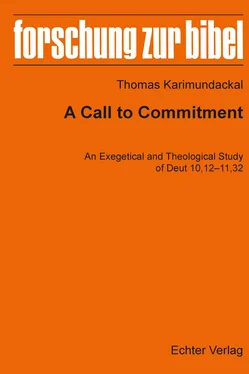• The “stiff-necked” (9,6.13.27 קשׁה־ערף) nature of Israel is taken up again in 10,16 exhorting them not to stiffen their neck any more (10,16 וערפכם לא תקשׁו עודb). In the wake of their continuous rebelliousness what is required is an unconditional attachment to the Lord, i.e, to “circumcise the foreskin of your heart” (ומלתם את ערלת 10,16 לבבכםa).
• 9,1-10,11 make clear that the acquisition of the land (9] ירשׁx] 9,1.3. 4a.4b.5a.b.6a.23; 10,11) is not due to Israel’s righteousness but Yhwh’s grace. 10,12-11,32 take up this issue again and assert that the possession of the land (6] ירשׁx] 11,8.10.11.23.29.31) is solely a Yhwh’s gift (4] נתןx] 11,9.17.21.31; cf. 9,6.23; 10, 11).
• The weqatal forms of וידעת in 9,3.6 and 11,2 are meant to know the nature and deeds of the Lord. While the weqatal וידעת in 9,3 calls attention to the deeds of the Lord in dispossessing the nations in the future, the weqatal וידעתם in 11,2 draws attention to the Lord’s mighty deeds in Egypt, at the Sea of Reeds and in the wilderness in the past (v2-7).
• Deut 9,1-10,11 show how Israel has provoked (כעס ;9,7.8.22 קצף 9,18) the Lord to anger and how he was angry with them (אנף v8.20; קצף v19). Deut 11,16-17 warn Israel again to stay away from all sorts of apostasy, lest the anger of the Lord be kindled against them (11,17 וחרה אף־יהוה בכם).
• Israel’s tendency to turn aside (9,12.16 סרו) from the way which is commanded them (9,12.16 מן־הדרך אשׁר צויתם) is the characteristic of their sin. In 11,16 Moses again cautions against Israel’s tendency to turn aside (11,16 סרו) and serve other gods.
• In 9,23 Moses recalls Israel’s disobedience (ולא שׁמעתם בקלו → שׁמע; cf. 1,19-45) by refusing to enter the land at Kadesh-Barnea. In 11, 13-17 Moses makes it clear that the entry into the land and their future prosperity in the land (cf.11,9-12) will be in accordance with their obedience (2] 11,13 שׁמעx]) to the commandments of the Lord. Similarly, being blessed or cursed in the land depends also upon their obedience or disobedience (11,27.28 שׁמע).
• In 9,1-10,11 Moses recalls their exodus from Egypt and Yhwh’s saving deeds in Egypt and in the wilderness (9,7.12.26.29). In 10,12-11,32 Moses reminds them again of their status in Egypt and Yhwh’s liberative deeds in Egypt, at the Sea of Reeds and in the wilderness (10,19.22; 11,2-7).
Summary: In the wake of crossing the Jordan, Moses makes it clear that the acquisition of the land will not be due to Israel’s righteousness but by Yhwh’s grace (9,1-6). Moses substantiates this by narrating the covenant breach at Horeb. He shows that they are recalcitrant, sinful by their nature and deeds (9,7-17). The covenant is restored solely because of Yhwh’s grace and faithfulness to his promises (10,1-5), as urged by Moses’ prayer (9,18-29). All the problems of Israel’s past sins are resolved by Yhwh’s grace and they are asked to cross the Jordan to possess the land (10,6-11). Thus, 10,6-11 lead the narrative smoothly to 10,12-11,32 with a command to resume their journey.
Deut 9,1-10,11 function like a negative foil of Israel’s past to provide lessons for their future life in the Promised Land. They have been saved from their past sinfulness and preserved in covenant relationship solely by virtue of Yhwh’s mercy and not by their own merit. Moses, therefore, passionately presents Israel’s failures in the past (9,7-10,5) as a criterion for their future life in the land (11,8-32). The memory of the broken tablets should be a permanent warning (9,7 זכר אל־תשׁכח) for their life in the land. The recurrence of the themes and the motifs of 9,1-10,11 in 10,12-11,32 shows their continual significance for their future existence in the land. Thus, the negative portrait of Israel in 9,1-10,11, i.e. Israel’s faithlessness and rebelliousness, has been used to teach Israel to walk in Yhwh’s ways in future. Thus, as they are preparing to resume their journey to take possession of the land (10,11) Moses prepares Israel to answer a very important question: “And now what does the Lord require of you?” (10,12).
2.2 The succeeding context
Deut 11 by and large deals with Yhwh’s giving of the land to Israel and their possession of it. In ch. 12 Moses begins to give detailed instructions to the people, beginning with their worship of the Lord, and how Israel is to live in the land that the Lord is going to give them. Deut 12, as the commencement of the specific stipulations, thus clarifies where and how Yhwh could properly be worshipped. Israel’s attitude to the sanctuaries of foreign nations (12,2-4.29-13,1) and the importance of “the place which Yhwh your God will choose” (12,5.11.14.18.21.26) stress that there has to be only one acceptable sanctuary for the whole of the land (v14) and Israel should bring there (12,5.6.11.26) the produce of the land as an offering to the Lord (12,6.11.13.14). We shall now look at ch. 12 as to how it is connected to and, at the same time, differs from 10,12-11,32.
2.2.1 Explicit connections between 10,12-11,32 and 12,1-31
As in the case of 9,1-10,11 and 10,12-11,32, the repetition of certain themes and motifs of 10,12-11,32 in 12,1-13,1 shows their mutual relationship and provides a larger context for 10,12-11,32, although 12,1-13,1 remain distinct.
a) Continuity in the communication: As far as the communication pattern in 12,1-13,1 is concerned, there is a continuity from 10,12-11,32 with regard to the speaker 49and the addressees. 50Moses in 12,1-13,1 continues to address the people of Israel giving specific instructtions regarding the right worship of Yhwh and the destructtion of pagan altars when they enter the land.
b) 11,31-32 as a bridge to Deut 12: Deut 11,31-32 form a transition and introduction to ch. 12. 12,1, for example, is closely related to 11,31-32 by repeating references to the gift of the land, statutes and judgments, showing a clear bridge between the general and specific stipulations. 51
you (11,31 אתם)
land (ארץ) Yhwh is giving (נתן qal ptc.) you (11,31)
keep (שׁמר) the statutes and the judgments (11,32)
keep (שׁמר) the statutes and the judgments (12,1)
land (ארץ) Yhwh has given (נתן qal pf.) you (12,1)
you (12,1 אתם)
Thus, Yhwh’s gift of the land and Israel’s obedience to the commandments of the Lord in 11,31-32 is reiterated at the outset of the Law Code in 12,1. 11,31-32 are also largely repeated in 12,10 with an emphasis on crossing the Jordan (12,10 ;11,32 עבר ירדן), on taking possession of the land (12,10 ;11,32 ארץ) which the Lord is giving (12,10 נחל ;11,31 נתן) them, and on living (ישׁב 11,32; 12,10 2x) in it.
c) Other Common Motifs:
• The superscription in 12,1 (אלה החקים והמשׁפטים) introduces what Israel has to keep as laws when they live in the land. 52However, the אשׁר clauses in 12,1 connect החקים והמשׁפטים to the already introduced motifs in 10,12-11,32, i.e. keeping the law in the land (אשׁר תשׁמרון בארץ לעשׁׂות; cf. שׁמר in 10,13; 11,1.8.16.22.32), the land as a gift to their fathers (אשׁר נתן יהוה אלהי אבתיך לך לרשׁתה; cf. 11,9.21.25), the gift of land for all the days that they live upon the earth (אשׁר־אתם חיים על־האדמה; cf. 11,9.21). Thus, 12,1 links the promises of the land and its possession to the right worship of Yhwh, which is the content of ch. 12.
• The hortatory command to keep (cf. שׁמר in 10,13; 11,1.8.16.22.32) the commandments is taken up again in ch. 12 (cf. שׁמר in 12,1.28; 13,1; see also 12,13.19.30) in the context of their arrival in the land. Similarly, the exhortation to obey (11,13 2xשׁמע.27.28) the commandments is repeated in 12,28 (שׁמע) in the context of their life in future.
Читать дальше












